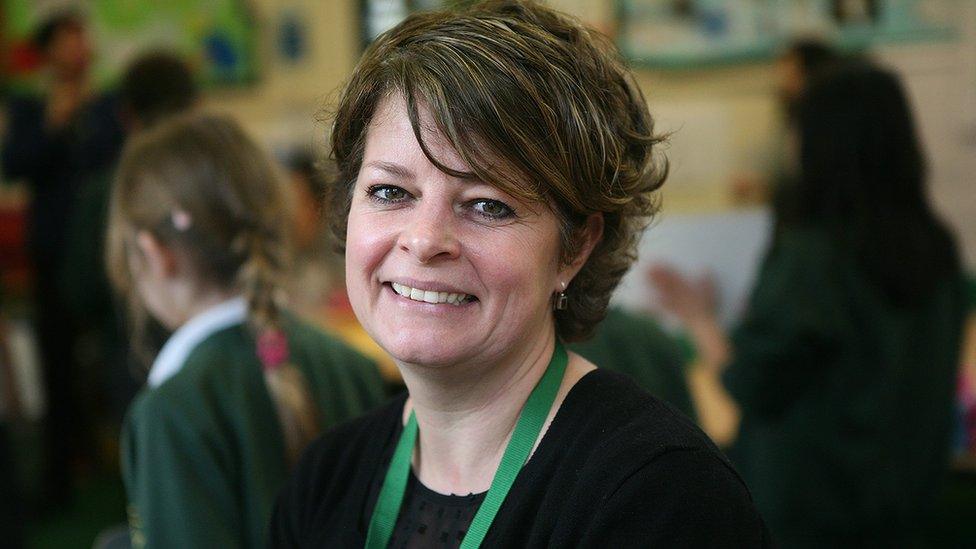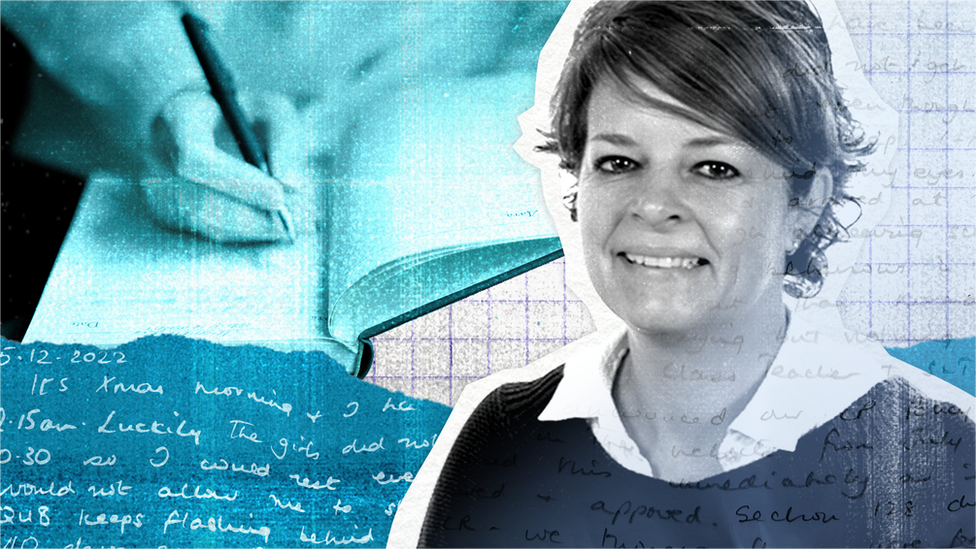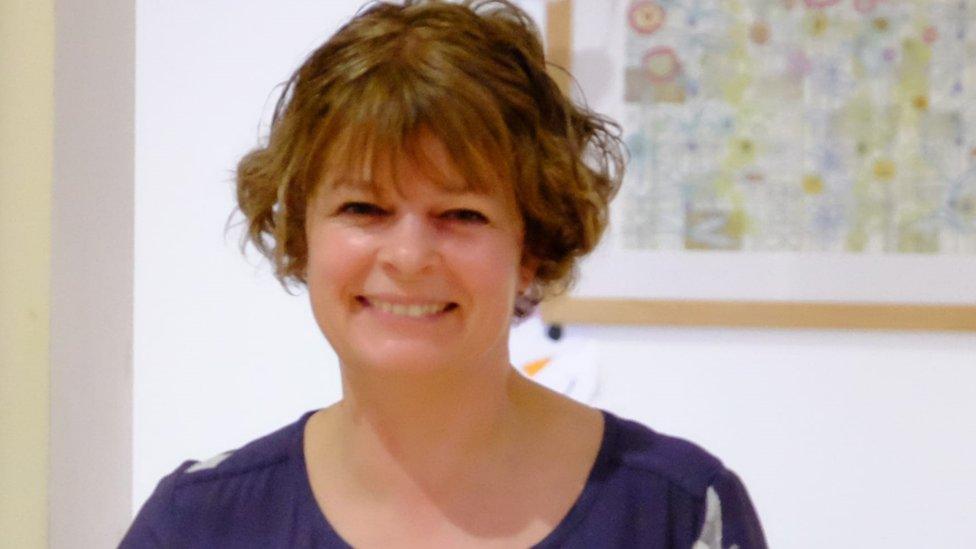'I couldn't handle the shame': Teachers' dread at Ofsted reports
- Published

Ruth Perry was the head at Caversham Primary School in Reading
It's a moment dreaded by head teachers - when the phone rings to tell you government inspectors are on the way to assess your school. For Ruth Perry that call came in November 2022. While waiting for Ofsted to publish their report and fearing losing her job, Mrs Perry killed herself.
Here other head teachers talk frankly about the mental health impact Ofsted inspections have had on them. Some of their accounts are upsetting.

When the call came, head teacher Claire had just ten minutes to get ready. Ofsted inspectors - responding to a complaint - had arrived unannounced. They were already in the school car park.
"I knew this was going to be a hard experience," she says. "What I didn't realise was just how brutal it would be."
Claire's inner city school had many challenges, she says, and the needs of the students were more complex post-Covid.
"We knew things were tough," she says, "but we also believed we had the right ingredients to keep things moving in the right direction."
Claire had more than 20 years' experience as a teacher and head teacher and she was passionate about her work, but that two-day long Ofsted visit completely changed her life.
When the "inadequate" judgement came, Claire says it felt like a public humiliation, despite having the support of her colleagues.
"I wanted to run away from my life, because I couldn't handle the shame of this report," she says. "The shame of this was something I'd never experienced before."
Claire began having frequent and debilitating panic attacks and developed chronic stress rashes. With both her career and health in tatters, she decided she would have to leave her job.
"As a family, we decided that I should get out as soon as I could," Claire says, "so I could concentrate on getting better."
The government's own figures show how hard it is to retain head teachers.
If you look at people who became head teachers in 2015 and were aged under 50, a quarter of those in primary schools had left within five years, and more than a third of those in secondary schools.
Even allowing for the fact some may have been promoted within academy trusts, this raises questions about why people might leave a job they have worked so hard towards.

For most head teachers, the Ofsted call comes the day before an inspection begins.
Tim had been a head for six years - something he had worked towards since first coming into teaching. He knew his school was overdue an inspection, but as he waited for the call he found himself consumed by dread.
"That year broke me because of the fear," says Tim, who was prescribed antidepressants.
After the inspection, Tim's school was downgraded to "requires improvement" and the school's governors held a closed meeting to discuss his future.
Driving somewhere, he pulled over and sat alone in his car feeling "desperate".
His thoughts turned to killing himself. He credits a phone call to a colleague - who stayed on the line while urging Tim to drive to his GP - as having saved his life.
Ruth Perry's sister reacts after inquest returns conclusion into her death
Within an hour of a mental health team being called to Tim's house, he received news announcing his school would likely become an academy.
Facing losing both his job and his livelihood, Tim says nobody asked how he was, or gave him any information about how to seek help.
Both Tim and Claire told the BBC they signed non-disclosure agreements (NDAs) as part of the financial deal with their redundancy packages. This was explained to Claire as being a common HR procedure, and at the time, she didn't question it. Like Tim she felt she had no choice - losing her job meant a loss of income, and she needed to support her family.
These confidentiality agreements make it hard to know how many head teachers have left like this, but Tim knows several other people who have - and believes there are many more.
"I think they are extremely common," Tim says. "It's a dirty little secret, it's sordid."

Like many head teachers, Rachel dreaded the call announcing that Ofsted would be coming to inspect her school.
"Your cortisol level is through the roof for most of the week," she says. "When your office phone rings you get that sick, sinking feeling until you know who it is on the other end."
When Ofsted did come she says inspectors were rude, and didn't take into account the challenges her school had faced since the pandemic - something Rachel says had contributed to an "overwhelming" feeling for her as head teacher.
"I am not making excuses or saying that we were better than we were," she says. "But we had been ambitious and tirelessly working to make improvements.
"Many mornings I seriously thought about doing something to seriously harm myself - so I had an excuse not to be in work."
It was the afternoon of Wednesday 14 November when the call came for Ruth Perry - whose school had previously been judged "outstanding". Speaking on the phone to the Ofsted inspector she told him: "We are ready, and keen to get started."
Ruth worked late with other members of staff getting prepared, and although she was apprehensive the following morning her husband Jon said she left the house "happy as usual".
But the visit didn't go well, and over the coming weeks, as she waited for Ofsted to publish its report, the thought of losing both her job and standing in the community contributed to her unravelling mental health.
Fifty-four days after the inspection at her school, Ruth Perry took her life, on 8 January 2023.
On 21 March 2023, Ofsted published its inspection report, rating Caversham Primary "inadequate".
On Thursday an inquest ruled that the Ofsted inspection had "contributed" to Ruth Perry's death. The inspection "lacked fairness, respect and sensitivity" and was at times "rude and intimidating", senior coroner Heidi Connor said.
Education Secretary Gillian Keegan said in a statement: "Ofsted is fundamental to making sure children are safe and receive the education they deserve.
"Together we will look closely at the coroner's recommendations to consider further changes to make sure we have an inspection system that supports schools and teachers, and ultimately secure Ruth's legacy."

Some teachers and heads find themselves consumed by dread when the call from Ofsted comes
Many thousands of Ofsted inspections are carried out every year without incident, there are 22,000 schools in England.
The system is there to make sure that children - who get just one chance at education - don't spend years in schools that are underperforming.
When a school like Caversham Primary - where Ruth Perry was head - is judged to be ineffective on safeguarding grounds, of whatever kind, the leadership is automatically judged as "inadequate". Head teachers' names appear on Ofsted's published report, which, heads say, can feel personal, and some have told us of their feelings of shame and public humiliation.
Ofsted has admitted it could do more to minimise the stress on head teachers, and has now promised more training.
After the inquest it also said it would provide a phone number for schools to call if they had concerns about an inspection, and would make it clearer when an inspection can be paused.
Two key sources of stress for Ruth Perry, according to the evidence, were the long wait for the report to be published, and the strict confidentiality warning that came with the draft report.
Mrs Perry didn't feel she could tell those closest to her, but Ofsted has now promised it will make it clear to head teachers, "they can share inspection outcomes with colleagues, family, medical advisers and their wider support group, before they are shared with parents".
School inspections have been in place for a century in England's schools, and for the last 30 years Ofsted has been in charge of them.
But over the past decade, Ofsted's budget has fallen and inspections have become much shorter - for a primary school usually just two days.
The government has argued school inspections and one word judgements are important to give parents the information they need. Heidi Connor, the coroner, said: "Transparency and ease of message to parents is not currently weighed against teacher welfare. The benefits are focused on without taking account of the risks."
Suicide is very rare, but Ruth Perry's death has prompted many other head teachers to open up about the mental stresses of the job and the impact of school inspection.
"What Ofsted did to me was break me during a time I was already struggling," says former head teacher Rachel. "I left work that day and never went back - I deserved better and my family deserved me."
All names have been changed.
If you're affected by the issues in this report, you can find support from BBC Action Line.

How Ruth Perry's death put Ofsted in the spotlight.



Are you affected by the issues raised in this story? Share your experiences by emailing haveyoursay@bbc.co.uk, external.
Please include a contact number if you are willing to speak to a BBC journalist. You can also get in touch in the following ways:
WhatsApp: +44 7756 165803
Tweet: @BBC_HaveYourSay, external
Please read our terms & conditions and privacy policy
If you are reading this page and can't see the form you will need to visit the mobile version of the BBC website to submit your question or comment or you can email us at HaveYourSay@bbc.co.uk, external. Please include your name, age and location with any submission.
- Published7 December 2023

- Published7 December 2023

- Published7 December 2023

